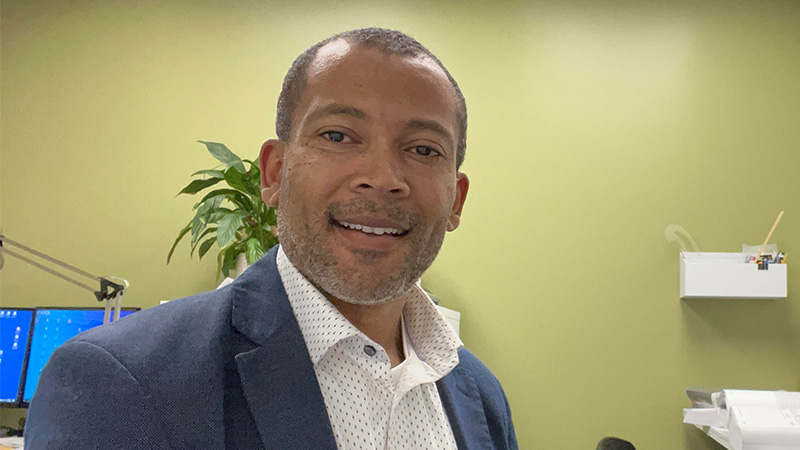Bruin Civil Engineer Found Inspiration in Outreach Programs

Charles Anderson ’02 still remembers the exact day he decided to become a civil engineer. It was his fifteenth birthday, and he visited the site of a Bay Area Rapid Transit (BART) extension of the Pittsburg/Bay Point Station on a high school field trip. That experience set him on a decades-long pursuit of a civil engineering profession.
Now the owner of an engineering consulting firm, Anderson Pine Corporation, in the East Bay of the San Francisco Bay Area, Anderson said he was captivated by the scale, complexity and organization of the construction site at BART. But his passion for engineering was first ignited in middle school through his involvement in Mathematics, Engineering, Science Achievement (MESA). The UC-administered program aims to support and advance underserved and underrepresented student achievement in science, technology, engineering and math. This early exposure to academic enrichment through the encouragement of his Algebra teacher and MESA’s weekend coursework at UC Berkeley laid the foundation for Anderson’s academic success.
“I was a dedicated MESA student from eighth grade through undergraduate at UCLA and even recently as a supporting member of the California MESA alumni,” Anderson said.
When it came time to apply for college, Anderson credits UCLA Samueli School of Engineering’s Center for Excellence in Engineering and Diversity (CEED) for his decision to become a Bruin.
“Without question, I can say that the multiple calls that I received from the CEED program ultimately led me to choose UCLA,” Anderson said. “The conversation felt genuine — like they wanted me to be at the school and that pull felt great and reassuring that UCLA was where I should be. I am forever grateful to the CEED program and its outreach and support during my time at UCLA.”
I am forever grateful to the CEED program and its outreach and support during my time at UCLA,” Charles Anderson said.
At UCLA, Anderson thrived in his academics and extracurricular activities, with MESA continuing to play a significant role in his undergraduate experience. After several years of participating in the program, Anderson decided to pay it forward, working at a high school and supporting students with their academics and MESA projects — just as the undergraduate and graduate students from UC Berkeley had done for him.
He credits UCLA for instilling in him a passion for lifelong learning and equipping him with the skills to navigate diverse challenges in the engineering field.
“UCLA taught me how to learn and the importance of thoroughly learning a subject matter from research, analysis and reporting,” Anderson said.
After graduation, one of Anderson’s professors helped him secure a position at the United States Army Corps of Engineers at the San Francisco District, where he worked on a host of civil works projects, including a complex demolition project along the Oakland Estuary.
While in the Army Corps of Engineers, Anderson enrolled in graduate school at San Jose State University, where he obtained a master’s in civil and environmental engineering. Later, as he prepared himself to launch his own business, he obtained an MBA from UC Davis.
Licensed to practice civil engineering in more than a dozen states, Anderson has been involved in the design of hydraulic structures and large ground-mount solar farms throughout the country for the past decade.
“It has been exciting to see the impact that civil engineers continue to make on the solar industry given its need for geotechnical, structural and drainage solutions for projects spanning thousands of acres and over various geological terrain,” Anderson said.
His advice for aspiring Bruin engineers is to balance academic learning with internship and work opportunities.
“These on-the-job opportunities can be instrumental in exposing students to the application of their learnings and provide encouragement during time when the coursework may not show a clear translation to practical implementation,” he said.
